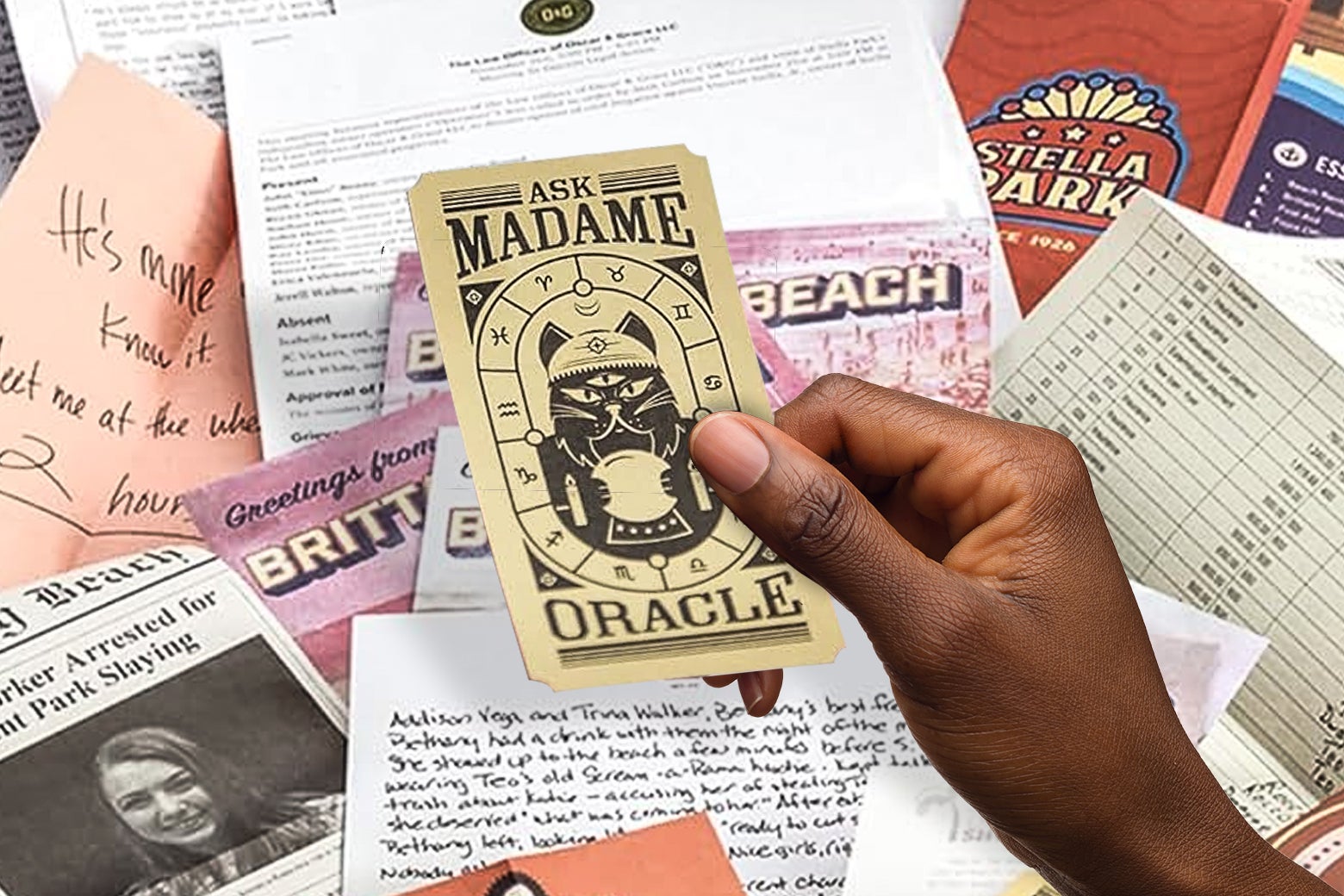Sign up for the Slatest to get the most insightful analysis, criticism, and advice out there, delivered to your inbox daily.
Back in June, I got a board game from a Buy Nothing group at the Slate office and tucked it away on my shelf for when I had enough company to play it. Actually, “enough” company isn’t exactly right—I needed the right company, a group that wouldn’t mind sitting down with me for two hours to play detective. The game—Body on the Boardwalk from Hunt a Killer—provides a handful of suspect profiles, interviews from bystanders, and real-looking evidence (napkins scribbled over with coded messages, printouts of a local business’s financial records, newspaper clippings, etc.), and tasks players with putting together a timeline of the day the victim was killed to ascertain which of the listed suspects actually had the means, motive, and opportunity to commit the crime.
It sounded like an ideal game to play with others; there would surely be heated deliberations and knowing “oooooohs” when key pieces of evidence were read aloud. But, about a month ago, I found myself home alone with a bottle of wine, a dream, and a few spare hours before I ought to retire to bed. I simply couldn’t watch more TV, I was too fatigued to read, and I needed to do something with my hands. I had been sitting on this game for nearly half a year! It was time: I wanted to solve a murder. Alone, without having to agonizingly deliberate with kin or explain the concept of alibis to a tween.
So I laid the evidence out on my floor, took out my laptop, made a timeline, and solved the case. Someone alert the press: I played my first board game all by myself—and liked it! It was simultaneously fun, relaxing, and challenging—and, in a word, weird. After all, I had been taught that board games are for camaraderie, for bonding with friends and family, for having fun with, you know, other people. Was my solo enjoyment of this collective activity some sinful act of depravity?
Seeking absolution, I turned to the place where all the freaks of the world find folks with similar proclivities: Reddit. As it turns out, there’s actually a term for playing board games without the company of others, though it’s not particularly imaginative: solo board gaming. I found the practice’s dedicated subreddit, r/soloboardgaming, teeming with individualists who take player-count advisories as mere suggestions. There, I learned that you can check out board games from your local library; that solo gamers love the games Spirit Island, Wingspan, and Mage Knight; that there are games cleverly constructed to be played directly on the rulebook or on the box cover; and that the demographic of people asking for solitaire game recommendations runs the gamut from full-time dads to grandparents soliciting suggestions on behalf of their only-child grandkids. Most importantly, I learned that the community’s ethos is to believe that, if you put your mind to it, almost any game can be a solo game.
On an old post asking the subreddit if anyone ever got lonely while gaming in solitude, the top comment in the replies gets at the core anxiety of solo board gaming: “When I first started playing solo, I didn’t feel lonely. But I did feel embarassed.” How many Redditors had stories of co-workers thinking they were weird for playing alone? I, too, wondered if my lonesome accomplishments weren’t piteous. When I broached the topic with the moderator of the subreddit, gamer and content creator Wakasm, he recalled his first few solo board gaming livestreams: “Ninety percent of the comments were often, ‘Why are you playing alone?’ or ‘I don’t get it.’ ” To this day, he noted, “There are still threads that ask, ‘Why play a board game solo when you can just play a video game?’ or feel that, without a social component, there is no value to playing alone.”
There are plenty of socially acceptable reasons why someone might need to become “a soloist,” as Wakasm referred to it. For instance, he started solo board gaming out of necessity as the one member of his game nights tasked with explaining a new game’s rules, and then more frequently as a silent activity to do while his newborn son slept, and even more when his mother, situated in a rural area with unreliable internet service, fell ill and he wanted something to do quietly beside her while she watched TV. These use cases aren’t rare. Scan the subreddit and you’ll find plenty of new parents sharing similar sentiments; and, of course, there are the only children, or those living in varying states of isolation, or even those who have tons of friends, but none interested in playing board games.
Yet nearly every gamer became a soloist in some way in 2020, when COVID quarantine locked everyone in their homes. Andy Matthews, founder of the long-standing board game media outlet Meeple Mountain, cited this moment as a turning point that changed the way people thought about board gaming: “As puzzle and board game consumption surged, so did the solo gaming movement.” Now, the solo gaming market is seemingly exploding. Evan Derrick, creative director at Van Ryder Games and the co-designer of Final Girl, a popular board game meant for solo play, credited his own game for some of that shift. According to Derrick, the early days of solo gaming were geared around puzzle-based games or beating your own score; now, in contrast, “there are a lot of different flavors of solo board games coming out.” Both Derrick and Matthews pointed to the growing demand for multiplayer games to also include a solo version. Some game designers are even specifically contracted to “inject a solo aspect into an in-development game,” per Matthews. Even then, there are some soloists who choose to dabble with strict multiplayer games, like Monopoly, where a minimum of two people are deemed requisite, as the gameplay involves talking to other people, whether to trade resources or to form alliances. This is different from cooperative games, where, though rare to act upon, the game rules acknowledge that the game could be played with one person in its normal form. Soloists achieve this by “multi-handing,” meaning, as Derrick explained, people “literally set up six different players or whatever the player count is,” and they proceed as if “Now I’m player one, now I’m player two, now I’m player three.”
But still, you may ask, why would anyone want to play a board game alone? Why do I relish the idea of shutting out the world with an activity designed to bring the world in? Wakasm listed some of the common reasons for solo gaming that he’s seen on the r/soloboardgaming subreddit: antisocial tendencies, admiring the ritual feeling of physically setting games up and tearing them down, and aspirational game designers conducting market research, to name a few. Both Wakasm and Derrick also pointed to a growing societal desire to evade the all-consuming presence of digital media. Derrick compared it to the difference between having an endless digital music library at your fingertips versus listening to vinyl: “Solo board games give people the option of relaxing or engaging in a game, in something fun, but with the bonus of it being tactile.”
Over the holidays, a season filled with plenty of game-night invitations, I realized that playing a game without other people quelled a small level of anxiety for me. In my youth, I used to love game nights. But now, older and more self-conscious, I find myself worried about looking stupid by getting a basic question wrong—or, much worse, letting my team down with a bad performance. On an intellectual level, I know that it shouldn’t be a big deal, but still, I found solving that murder by myself so much more relaxing than, say, struggling to get my friends to guess a word in Taboo.
Yes, I know that I’m overthinking this. After all, people have been playing games with themselves for ages, as Wakasm reminded me: “Our grandparents played solitaire. If you’ve done Wordle or Sudoku then you’ve tapped into what a board game solo could offer.” And yet I couldn’t stop searching for some deeper meaning of what choosing to play a multiplayer game alone seems to say about a person, if anything. Thirteen years ago, a Reddit user asked: “I once played Monopoly by myself, what’s the most forever alone act you have done?” While other people chimed in with the expected hilarious answers—“I had sex with myself once,” someone responded—others commented that they played entire games of Risk, or Magic the Gathering. Is there really something so pathetic—“forever alone” style—about playing such multiplayer games by oneself, bereft of the kind of conversing (or arguing) that such games normally require? To the solo board gamer, the answer is no—one could even posit that playing this way could make the game even more challenging and, thus, fun. In fact, we might even consider it the better way of playing. As a designer, Derrick points out that the main difference between playing a game alone and playing with other people is that “in a multiplayer game, other human beings create a lot of the tension between players, and that will cover up either issues with the design or whatever. It’s a variable that you can’t plan for exactly.” This is in contrast to a solo game, in which “there’s not a lot to hide behind.”
You heard that right: Enjoying one’s own company via multi-handing doesn’t mean teetering on the borders of chronic loneliness. Rather, it may even be the purist’s form of gaming. Is that not, from Derrick’s words to God’s own ears, proof that all of us so-called forever alone people are in the right?
Look, people can be nice and fun and great! I love them most of the time! They can also be incredibly exhausting, frustrating, and overwhelming. Some board games bring people together, whereas some games of Monopoly have caused such rifts in families that the game is the one boundary some cousins won’t cross with each other. There’s room for both styles of playing, but I’ve seen the light: I’m a solo board gaming convert. Want to really be up for a challenge? The next time someone asks you to go to a game night, say you’re already busy with another. Then go home, pull out your favorite board game, and turn it into your own party, no plus-ones needed.

















